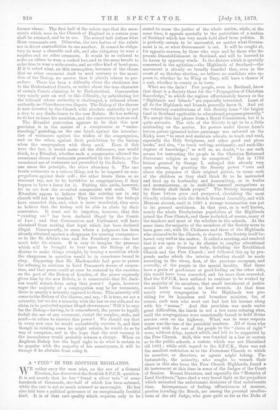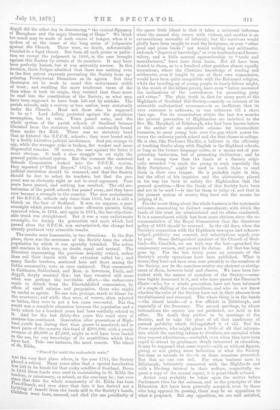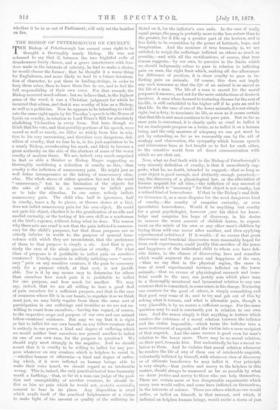A " FIND " IN THE SCOTTISH HIGHLANDS.
WE rather envy the man who, on the eve of a General Election, has discovered the Scottish S.P.C.K. question. It is not merely that he has "found a silver vein" of some hundreds of thousands, die-half of which has been misused, while the rest is not so much misused as unwrought. Ile has also laid bare a political grievance of an exceptionally fruitful kind. It is of that rare quality which requires only to be
stated to rouse the justice of the whole nation, while, at the same time, it appeals specially to the patriotism of a section of Scotland which has very much held aloof from politics. It is perfectly certain to be successful, no matter what Govern- ment is in, or what Government is out. It will be caught at, for opposite reasons, by those who urge and by those who de- precate Disestablishment in Scotland, and will be hurried to its haven by opposing winds. In the district which is specially concerned in the agitation—the Highlands of Scotland—the movement is already so broadly founded that, even in the event of an October election, we believe no candidate who op- poses it, whether he be Whig or Tory, will have a chance of seat, whether in county or in town.
What are the facts ? Few people, even in Scotland, know that there is a Society there for the "Propagation of Christian Knowledge," in which the regions affectionately known as the "Highlands and Islands" are especially interested. Least of all do the Highlands and Islands generally know it. And yet the voluntary contributions of this Society form "the largest fund in Scotland applicable to educational purposes generally." We accept this last phrase from a Royal Commission, but it is quite accurate. The title of the Society is apt to be a little misleading on the matter. Its powers under Queen Anne's letters patent (granted before patronage was enforced on the Kirk), were "to erect and maintain schools, to teach and read, especially the Holy Scriptures, and other good and pious books," and also, "to teach writing, arithmetic, and such-like degrees of knowledge ;" as well as, no doubt, "to use such means for instructing the people in the Christian Reformed Protestant religion as may be competent." But in 1738 loiters granted by George I. enlarged this already very open scheme, by granting the Society power "over and above the purposes of their original patent, to cause such of the children as they shall think fit to be instructed and bred up to husbandry and housewifery, or in trades and manufactures, or in such-like manual occupations as the Society shall think proper." The Society incorporated by these letters grew and prospered, cherishing the most friendly relations with the Scotch General Assembly, and with Missions abroad, until in 1843 a strange termination was put to its general usefulness. In that year, as is well known, nearly the whole Presbyterian population of the Highlands joined the Free Church, and these included, of course, many of the teachers and most of the scholars in the schools. At the same time, the majority of the members of the Society seem to have gone out, with Dr. Chalmers and those of the Highlands who claimed tobe the Church, in deserta. The Society itself be- hayed very well in the matter. It called a meeting, and resolved that it was open to it by its chartor to employ educational agents of any Protestant body, including the Established Church and the Free Church ; and followed this up by pro- posals under which the interim selection should be made according to the views, first, of the previous occupant, and secondly, of the people in the special locality. Had there been a grain of good-sense or good-feeling on the other side, this would have been conceded, and far more than conceded. Had the S.P.C.K. been suffered to continue to be worked by the majority of its members, that small instalment of justice would have done much to heal wounds. At that time nearly every congregation in the Highlands was pro- viding for its houseless and homeless minister, for, of course, each man who went out had lost his income along with his "manse," And this provision was made under great difficulties, the lairds in not a few cases refusing sites, until the congregations were occasionally forced to hold divine
service even on the highway. What was in some respects worse was the case of the parochial teachers. All of them who adhered with the rest of the people to the "claim of right" were, without delay, turned adrift, and left to be supported by the Free Church. Still, this was founded in a law or custom as to the public schools, a custom which was not liberalised till 1861 ; while with regard to the S.P.C.K., there was not the smallest restriction as to the Protestant Church to which its member, or directors, or agents might belong. Un- fortunately, the minority, who sought to wrench their share in this also from the Free Church Highlands, found a fit instrument at this time in sonic of the Judges of the Court of Session. Recent literature, and especially the "Memoirs of Lord Cockburn," have shed a very broad light on the prejudices which animated the unfortunate decisions of that unfortunate time, Intemperance of feeling, offensiveness of manner, passion invading the Bench, are among the personal recollec- tions of the old Judge, who goes quite as far as the Duke of Argyll did the other day in denouncing "the cynical flippancy of Brougham and the angry blustering of Hope." We think too much may be made of such excess of temper, when it is spoken of as the cause of the long series of judgments against the Church. These were, no doubt, substantially founded in a legal theory. But from all such praise or pallia- tion we except the judgment in 1846, in the case brought against this Society by certain of its members. It may have been perfectly honest, but it was miserably narrow. In this decision, three Judges admitted that there was nothing even in the firstpatent expressly preventing the Society from ap- pointing Presbyterian Dissenters as its agents. But they thereupon set to work to mend this unfortunate width of trust ; and recalling the more intolerant views of the time when it took its origin, they insisted that these must be read into the constitution of the Society, as what may have been supposed to have been left out by mistake. The parish schools, only a century or two earlier, were statutorily under the Church. Must not these also be supposed to be so V Lord Jeffrey protested against the gratuitous assumption, but in vain. Years passed away, and the whole system of the parish schools of Scotland became liberated from the statutory bond which confessedly bound them under the Kirk. There was no statutory bond that so fettered the S.P.C.K. schools ; they were bound only by a feebly imitative judicial intolerance. And yet, strange to say, while the stronger yoke is broken, the weaker and more disgraceful remains. Of course, the case against the latter is more obvious. It took a slow struggle to set right the general public-school system. But the moment the endowed Schools Commission looked into the S.P.C.K, system, they reported (" Third Report," 1875), not only that this judicial restriction should be removed, and that the Society should be free to select its teachers, but that the pro- posal was so obviously right as not to need argument. Four years have passed, and nothing has resulted. The old sec- tarianism of the parish schools has passed away, and they have now become a strength to the country. The now sectarianism of the S.P.C.K. schools only dates from 1843, but it is still a blotch on the face of Scelland. It was, we suppose, a pure oversight which prevented the more offensive parasite being removed when, in 1861, and again in 1874, the less objection- able trunk was straightened. But it was a very unfortunate oversight, for during the generation and more which had passed since the S.P.C.K. was sectarianised, the change had already produced very miserable results.
The results were lamentable, in two directions. In the first place, there was the severance of the Society from the whole population for which it was specially intended. The action and reaction in this were, no doubt, equal and mutual. The Directors representing the previous majority retired, rather than soil their hands with the extrusion called for;, and many Gaelic teachers, scattered here and there among the Celtic community, were at once cashiered. That community in Caithness, Sutherland, and Ross, in Inverness, Perth, and Argyll, deeply resented this; but they resented still more what was perhaps the inevitable effect,—the endeavours made to detach from the Disestablished communion, by offers of small salaries and perquisites, those who might be useful as agents. No one was, perhaps, much to blame for the overtures; and while they wore, of course, often rejected as bribes, they were in not a few cases successful. But the. result was a complete alienation between the population and a body which for a hundred years had been cordially related to it. And for the last thirty-five years this cruel state of matters has continued. Generation after generation of High- land youth has during that time grown to manhood, and in most parts of the country this fund of £200,000, with a yearly revenue of £6,000 or £7,000, might as well have been buried in the sea, for any knowledge of its capabilities which they have had Take one instance, the most remote. The island of St. Kilda, "Placed far amid the melancholy main,"
was the very first place where, in the year 1711, the Society Placed a school. Many years after that a special benefaction was left in its hands for that rocky satellite of Scotland. Down to 1843 these funds were used in maintaining in St. Kilda the soacher, or missionary, or school, as the case may be ; but ever ince that date the whole community of St. Kilda has been rree-Clhurch, and ever since that date it has derived not a farthing of benefit from the funds still in the Society's hands. Children were born, sneezed, and died (for one peculiarity of
the queer little island is that it takes a universal influenza when the annual ship comes with visitors, and another is an extraordinary mortality of infants); but the survivors would gladly have been taught to road the Scriptures, or even "other good and pious books ;" nor would writing and arithmetic, and such" degrees of knowledge," or oven husbandry and house- wifery, and a little manual apprenticeship to "trade and manufactures," have done them harm. But all have been denied to them, as to a hundred other parishes almost equally necessitous, where the Christian knowledge of reading and arithmetic, oven if taught by one of their own communion, would have been quite compatible with the Reformed religion, while the breeding-up of young people to handy labour might, in the words of the letters patent, have even "better answered the inclinations of the contributors for promoting piety and virtue." The plain truth is, that for many parts of the Highlands of Scotland this Society—mainly on account of its miserable ecclesiastical severance—is so inefficient that its very existence is unknown, or was unknown till a short time ago. For its resuscitation within the last few months the present generation of Highlanders are indebted to the Rev. Mr. Macphail, of Edinburgh, who had been known before as the author of an admirable scheme for intermediate bursaries, to carry young lads over the gap which yawns be- tween the ordinary parish school and the first classes at college. He is also, like Professor Mackie, a believer in the efficiency of teaching Gaelic along with English in the Highland schools, so long as the former language exists, as a means not of per- petuating barbarism, but of promoting ; and he had a strong view that the funds of a Society origi- nally intended "to teach the young to read, especially the Holy Scriptures," might be used to teach them to read them in their own tongue. He is probably right in this, but the effect of his inquiries and the obstruction placed in his way has been to satisfy the Highlanders that the general question,--How the funds of this Society have been and are to be used ?—is one for them to judge of, and that in the present system of secrecy they have not the means for judging of it.
For the worst thing about the whole business is the systematic reticence, amounting to distinct concealment, with which the funds of this trust are administered and its affairs conducted. It is a concealment which has been more obvious since the re- commendation of the Royal Commission that the disastrous policy of 1843 should be reversed. In the old days, when the Society's connection with the Highlands was open and acknow- ledged, publicity was courted, and subscriptions urged, year by year. Some distinguished minister of the Church of Scot- land—Dr. Candlish, we are told, was the last—preached the anniversary sermon, and pressed its claims. All that has long gone by. For the last thirty years no accounts of the Society's yearly operations have been published. What is worse, they have not been even sent privately to the members of the Society, nor do the members receive any abstract or abridg- ment of them, however brief and elusive. We have been fur- nished with the names of members of the Society—mem- bers highly honoured in it, and who have passed the Director's Chair—who, for a whole generation, have not been informed of a single shilling of the expenditure, and who do not know whether the rules of the Society have not in their absence been revolutionised and reversed. The whole thing is in the hands —the closed hands—of a few officials in Edinburgh, and especially of the Secretary. The annual meetings, by whose instructions the reports are not published, are held in his
office. No doubt they profess to be meetings of the Society, and to take the place of all that machinery of earnest publicity which distinguished it of old. But the Press reporters, who might glean a little of all that informa- tion which the meeting refuses to circulate, are excluded when they request admittance,—excluded, oven when they have been urged to attend by gentlemen deeply interested in education. It may be supposed that some report—with or without figures, giving or not giving some indication of what the Society has done or intends to do—is on these occasions presented. But this no one can tell. For when business men in Edinburgh, intimately connected with the Highlands and with a life-long interest in their welfare, respectfully re- quest a copy of the annual report, it is point-blank refused. Action may probably be taken upon the matter before Parliament rises for the autumn, and as the principles of the Education Act have been generally accepted, even by those who long opposed its passing, there may be no opposition to what is proposed. But any opposition, we are well satisfied, whether it be in or out of Parliament, will only set the heather on fire.




































 Previous page
Previous page